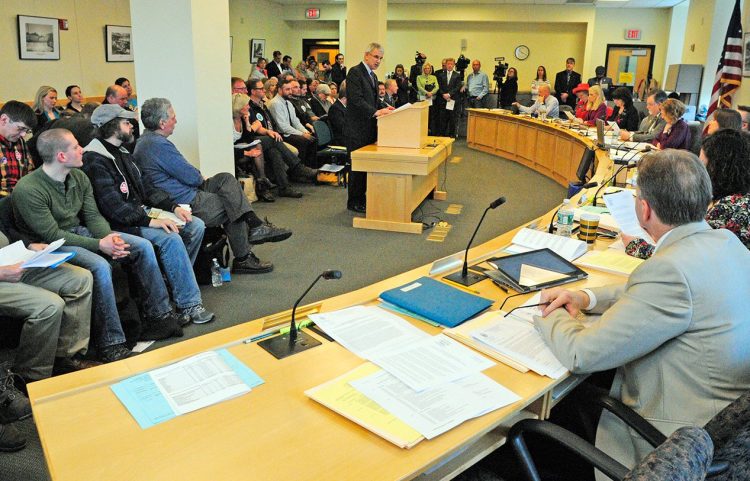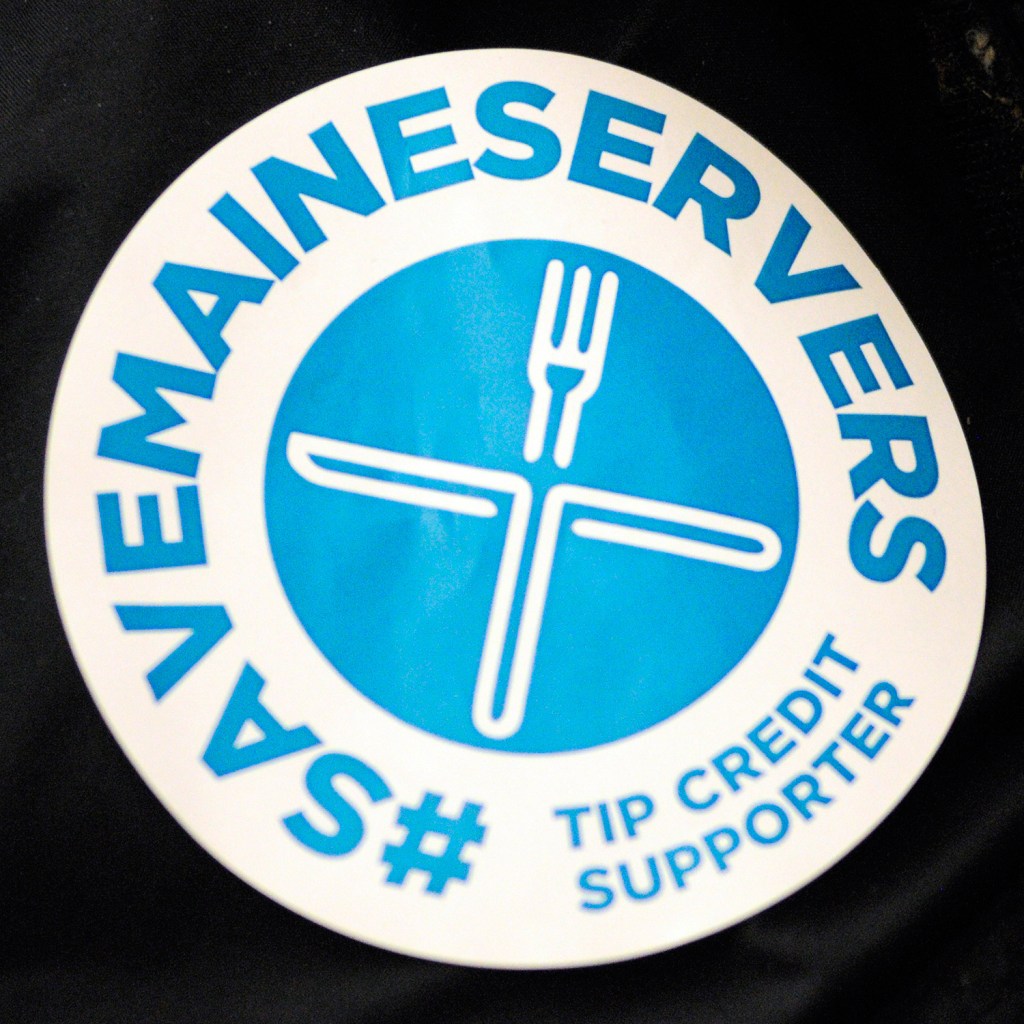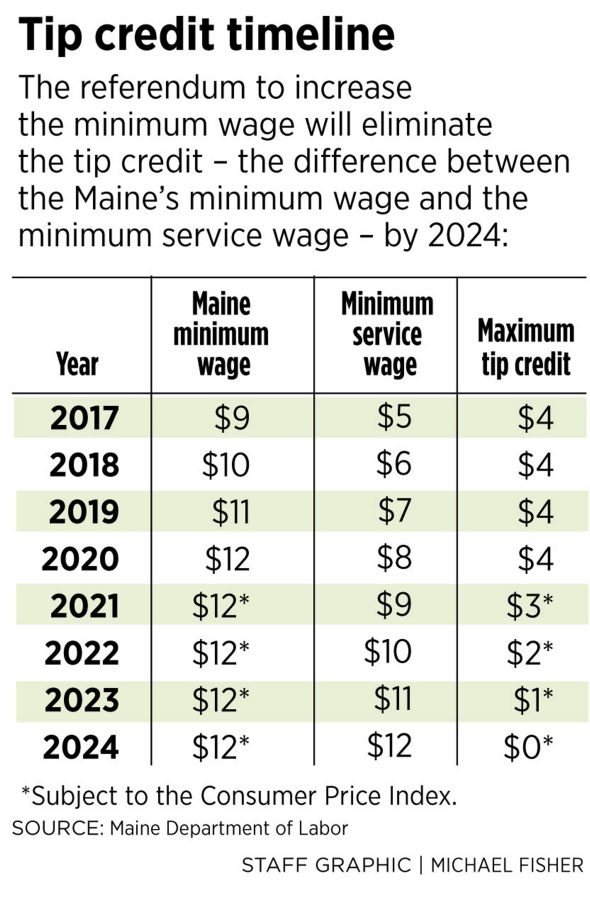AUGUSTA — As a mother of young children, Ali Boulier said she was drawn to bartending and food service by the flexible hours and earning potential offered in Maine’s restaurant scene. Those flexible hours – combined with support from her tight-knit group of co-workers – also provided Boulier with a “sense of normalcy” when she had treatment for breast cancer last year.
So Boulier said she can’t help but wonder if voters’ decision to phase out the “tip credit” is a factor when she gets “stiffed” by a customer who wrongly assumed her hourly wage jumped to $12 in January.
“Without the tip credit, the income opportunities will not be there for me and I could not – and would not – do this job,” Boulier told lawmakers Wednesday. “I didn’t ask for this, my workers didn’t ask for this.”
Boulier was one of dozens of restaurant workers who testified Wednesday during a marathon public hearing before the Legislature’s Labor, Commerce, Research and Economic Development Committee on proposals to change the minimum wage law approved at the ballot box in November.
DISAGREEMENT ON IMPACT OF TIPS CHANGE
While the majority of workers urged lawmakers to retain the tip credit, which allows employers to pay tipped employees a lower hourly wage, others said the experiences of other states show that paying waiters, bartenders and other restaurant workers a higher base wage does not mean customers will become less generous when tipping.
“I believe this is an issue of dignity,” said Julia Legler of Portland. “Servers deserve a base wage and I think they will get more respect from their customers if they are paid a higher amount, and it won’t put them in an unhealthy power dynamic between them and their customers.”
Roughly 55 percent of voters endorsed raising the statewide minimum wage from $7.50 an hour to $12 an hour by 2020 through annual increases that began this January. Question 4 also increased the minimum wage for tipped workers from $3.75 to $5 an hour Jan. 1, followed by annual $1 increases until the wage hits $12 an hour in 2024.
Lawmakers are considering two bills, L.D. 673 and L.D. 702, that would retain the tip credit. And Wednesday’s strong turnout from restaurant workers illustrated their concerns that the shift will end up hurting – not helping – the public face of a major cog in Maine’s more than $5 billion tourism industry.
Restaurant owners and servers – many wearing shirts sporting their restaurant logos alongside stickers reading “Save Maine Servers” – packed several overflow rooms hoping to testify.
Moody’s Diner, a midcoast institution located on U.S. 1 in Waldoboro, was closed Wednesday so employees who wanted to testify could make the trip to the State House.
Jill Nutter, who has worked as a server at Moody’s for 20 years, said she is concerned that the phase-out of the tip credit will affect her and others who support their families as career servers. Nutter said a lot of customers are confused about the minimum wage and the tip credit.
“As a server, I am not comfortable telling my patrons what to tip me,” she said.
‘UNSUSTAINABLE’ OR ‘RIGHT THING TO DO’
Moody’s owner Dan Beck estimated that the changes to the tip credit will cost his business between $30,000 and $40,000 this year, and that the figure will swell to more than $300,000 by 2024. Beck said such cost increases are “unsustainable” for mom-and-pop restaurants.
“We can sustain this for a few years, but because this compounds, there is going to come a point where we can’t sustain it any more,” he said.
James Warwick, general manager at Old Vines Wine Bar in Kennebunkport, said many restaurant jobs in his native London – where tipping is not customary – tend to be filled by younger workers, but food service in Maine is a legitimate career because workers can make a good living. He fears eliminating the tip credit will actually cut into those wages by discouraging tipping, driving some of his employees to find work in neighboring New Hampshire.
“The system for restaurant workers was not broken, but it is now,” Warwick said.
But the organizers of November’s successful minimum wage ballot initiative – most notably the liberal activist group Maine People’s Alliance and the AFL-CIO – also turned out their supporters in sizable numbers.
Kathryn Harnish, co-owner of The Vault restaurant in Houlton, acknowledged that phasing out the tip credit will be a significant change.
“But uncertainty about how things might play out does not mean that we should not move forward,” Harnish said. “We want to reward our employees with a fair living wage. It’s just the right thing to do.”
The “expert witness” for those advocating to end the tip credit, Saru Jayaraman with the Restaurant Opportunities Center, told committee members that restaurant servers in Maine and nationally are more likely to rely on food stamps than other workers. Jayaraman also pointed out that seven states – including California, Alaska, Minnesota and Montana – do not allow owners to pay tipped employees a lower wage.
“We’ve seen the other side,” she said. “We’ve seen workers and employers doing better in other states.”
HEAVY TURNOUT ADDS HOURS TO HEARING
Wednesday’s hearing was, on paper, scheduled to run from 10 a.m. to noon. But bill sponsors and other lawmakers consumed all of that time – plus some – sharing their personal thoughts on the bills before any of the dozens of restaurant workers listening in overflow rooms had a chance to testify before the committee. The hearing was still going strong at 6 p.m.
It was easy to discern many committee members’ stances on the tip credit issue by their lines of questioning with speakers – and by their party affiliation.
Republicans are more likely to support the bills to change the ballot initiative results and preserve the tip credit, which previously allowed employers to pay tipped workers 50 percent of the existing minimum wage as long as servers’ tip income made up the difference. Democratic members are more likely to support leaving the ballot initiative intact and allowing the hourly wage of tipped workers to rise to $12 an hour by 2024.
Much of the focus in the coming weeks, as the tip credit issue moves toward votes in the full House and Senate, will be on potential swing Democrats. The Maine People’s Alliance already has targeted Democrats co-sponsoring the bills to restore the tip credit.
One of those lawmakers, Sen. Bill Diamond, D-Windham, said a minimum wage increase was long overdue, but he supports restoring the tip credit after hearing from local servers in his district in the Sebago Lake area.
“I respect highly the vote of the people … but in this case, I think there are segments (of the referendum) that we need to look at,” Diamond said.
Kevin Miller can be contacted at 791-6312 or at:
Twitter: KevinMillerPPH
Send questions/comments to the editors.







Comments are no longer available on this story